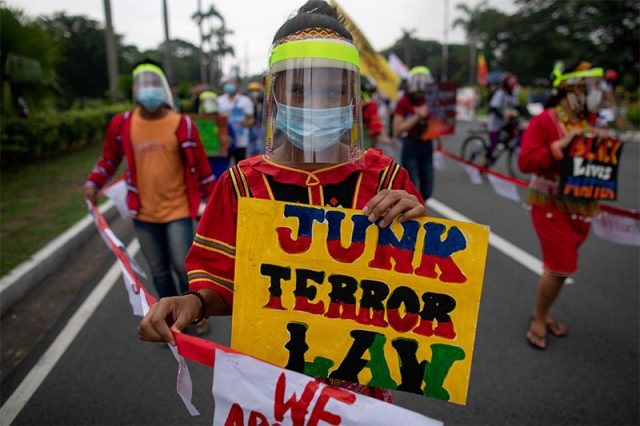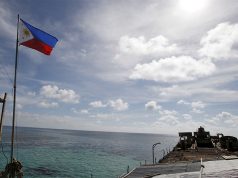
Three petitions have been recently filed before the Supreme Court to challenge the constitutionality of the new anti-terrorism law, following its passage last Friday.
President Rodrigo Duterte on July 3 signed the Republic Act No. 11479 or the Anti-Terrorism Act of 2020. This new law repealed the Human Security Act of 2007, which was the country’s previous long-running measure to counter-terrorism.
READ: Duterte signs anti-terrorism bill into law — spokesman
Law and civic organizations, activists and experts had expressed strong dissent against the measure since last February because some of its provisions were perceived to trample on basic human rights and other civil liberties.
The Philippine National Police and the agency it is under, the Department of Interior and Local Government, earlier assured the public that they should not fear the new law’s provisions.
National Security Adviser Hermogenes Esperon Jr. also said that “law-abiding” Filipinos have nothing to fear.
“Kung tahimik naman sila, huwag sila mababahala. Kung ang pakay mo bilang aktibista ay magsaad ng iyong mga hinaing, social injustices, or request for better treatment or ideas, papayagan natin ‘yan,” he said.
Presidential spokesperson Harry Roque and two of the law’s principal authors—Sen. Panfilo Lacson and Senate President Vicente Sotto also welcomed Duterte’s decision to sign the proposed bill into law.
The National Union of People’s Lawyers, one of the largest law groups in the country, announced that it will hold off its plan to challenge the constitutionality of the controversial measure to consider more petitioners to join them and review facts, issues and procedural requisites of their draft.
NUPL previously said that they had been ready with the draft petition since June.
Retired Senior Associate Justice Antonio Carpio, who has held the post as acting chief magistrate several times, also said that he will join any legal petition against the anti-terror bill to the Supreme Court.
“If it is signed into law, I have told my friends I will join a petition to question the constitutionality of this law,” Carpio said via a webinar last June 17.
Rundown of petitions filed
Meanwhile, concerned individuals and legal groups separately filed petitions, before the high court, amid the prevailing online public clamor to revoke the anti-terror law.
From law professors
In a Facebook post on July 4 or less than 24 hours after the bill’s passage, a private law office Calleja Law Firm shared that their lawyers submitted their plea by electronic filing with the SC. The petitioners include Ateneo law professor Atty. Howard Calleja, University of the Philippines law professor Atty. Christopher Lao and Brother Armin Luistro of the De La Salle University.
A group of lawyers led by Ateneo and La Salle law professor and lecturer Atty. Howard “Howie” M. Calleja filed today, by…
Posted by Calleja LAW FIRM on Friday, July 3, 2020
On Monday, these petitioners went to the high tribunal building to submit the physical copy of their plea.
Lao, also a social media personality, sought prayers from his followers.
Please pray for us! 💪 🙏 https://t.co/MqJaJ7m9i8
— Christopher Lao 劉 (@iamchrislao) July 4, 2020
Issues or questions raised: The group, led by Calleja, argued that the provisions of the law are “oppressive and inconsistent” with the Constitution.
They were the first to raise the law’s unconstitutionality.
“While threats to our national security need to be addressed, the law, as crafted, is oppressive and inconsistent with our Constitution, hence, the petition. This fight against terrorism should not and should never be a threat to the fundamental freedoms of all peaceful Filipinos,” the lawers said.
From Rep. Edcel Lagman (1st District, Albay)
Lagman, also a human rights advocate, had been vocal about his view against the counter-terrorism measure when members of the Lower House were still deliberating the bill last June.
He also filed his petition on Monday.
Issues or questions raised: Similar to Calleja’s group, Lagman also argued that some provisions of the new law violate several human rights provided by the Constitution.
Among these are the vague definitions of acts of terrorism and terrorists, the imposition of prolonged detention without redress of grievances and legalizing wiretapping and technical surveillance of suspected individuals, and the judicial powers granted to the Anti-Terrorism Council.
From FEU Law professors, Dean Mel Sta. Maria
Faculty members of the FEU-Institute of Law, led by Sta. Maria, was the third group to submit their legal challenge.
They also asked the high court to issue a temporary restraining order stopping the government from implementing some of the law’s provisions which were perceived questionable.
In his social media post, Sta. Maria said that he had to temporarily come out of his retirement to file their petition against the anti-terror law.
“It will be great to argue again before the Supreme Court and once again greet the justices ‘may it please the Court,’” he said.
unretiring to file a case. pic.twitter.com/n8gWJquhvM
— Mel Sta.Maria (@attymeltweet) July 5, 2020
In another tweet, Sta. Maria shared a photo giving a peek of the petition he and his colleagues filed before the SC.
FILED! pic.twitter.com/HvsTePwsUz
— Mel Sta.Maria (@attymeltweet) July 6, 2020
Issues or questions raised: The FEU professors sought a halt order against the provisions that defined the acts of terrorism and that allowed the ATC to red-tag individuals and detain them without a warrant for up to 24 days.
Similar to the earlier petitioners, they also perceived the terrorism definitions as too vague, which would interfere in academic institutions “on what and how to teach.”
From the Makabayan bloc
Six representatives under the Makabayan bloc, led by House Deputy Minority Leader Carlos Zarate (Bayan Muna party-list), were the fourth petitioners to assail the anti-terror law.
Issues or questions raised: In their petition, the lawmakers cited incidents of terrorist-tagging or red-tagging by state forces as grounds to declare the law unconstitutional.
They urged the SC to strike down the entire Anti-Terrorism Act of 2020.
“In this case, the dangerous and treacherous character of the term ‘terrorism’ becomes apparent, considering the pervasive practice of red-tagging, terrorist-tagging and vilification against activists, dissenters and the political opposition,” their petition read.









